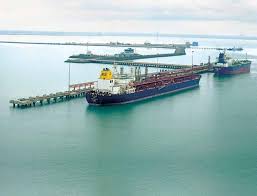
EU Sanctions start to disrupt Clean Product Exports from Nayara’s Vadinar Refinery
LONDON : The European Union’s latest sanctions on Nayara Energy, India’s Rosneft-linked refiner, are beginning to impact clean product flows out of the Vadinar terminal visibly. Oil flows voyages tracking India-origin seaborne shipments show that the Naraya Vadinar Refinery handles roughly 10.5% of total Indian clean exports.
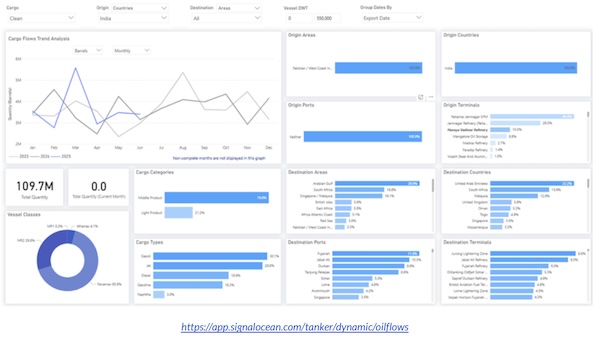
A closer examination of India’s monthly clean oil exports shows a sharp peak in March, followed by a marked decline through April and May. This trend coincides with the typical second-quarter maintenance season at major Indian refineries, most notably at Reliance’s Jamnagar complex, the world’s largest refining hub and a critical source of clean product exports. In April, media reports confirmed that Reliance shut down one crude distillation unit along with several secondary units at Jamnagar for a planned 21-day maintenance. The export slowdown appears to have primarily affected middle distillates, which comprised nearly 79% of all clean cargoes shipped during the period.
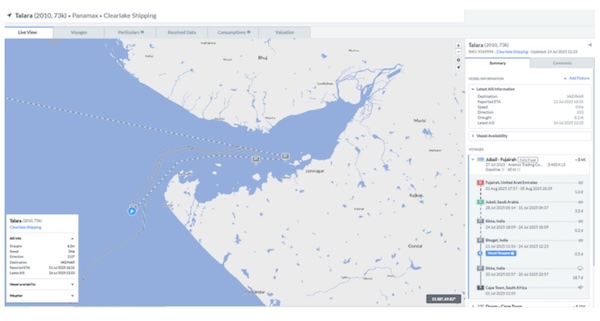
Additional pressure on flows may stem from early reticence among charterers and traders anticipating tighter scrutiny of Russian-linked product supplies. Compounding this backdrop, early signs of disruption have emerged, including the withdrawal of a scheduled naphtha export tender and the tightening of payment terms for product cargoes.
Recent Vessel Diversions from Vadinar Reflect Sanctions Exposure AIS tracking around the Vadinar terminal reveals a pattern of emerging disruptions tied to cargoes associated with Russian-origin crude. The clearest signal of Western disengagement came when a BP-chartered vessel bound from Vadinar toward East or Southern Africa had its voyage canceled, prompting a full U-turn and diversion toward the Arabian Gulf. This mid-voyage U-turn highlights a deliberate operational decision by a major Western oil company to distance itself from product flows linked to Russian supply chains.
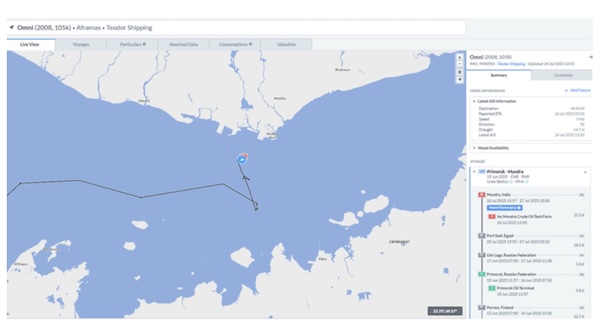
AIS tracking also shows several cases of altered routing or delayed operations involving tankers at or near Vadinar. One vessel initially signaled Vadinar for discharging Russian-origin crude but later changed her AIS destination to Mundra, suggesting a shift away from the politically sensitive terminal.
Another vessel changed her declared discharge destination from Port Louis to Dubai after loading at Vadinar, reflecting possible post-loading commercial or logistical adjustments.
A separate tanker remained anchored off Vadinar for seven days, significantly longer than the usual operating time of around two days, indicating potential complications with cargo readiness or clearance. In addition, a planned voyage chartered by a Chinese company was canceled before loading commenced. Overall, the recent operational disruptions, evident in vessel diversions, delayed departures, and destination changes, reflect a growing sensitivity among market participants to the reputational and compliance risks linked to Russian-affiliated product flows.
Looking ahead
While naphtha accounts for just 3% of India’s clean product exports, growing concern now surrounds higher-volume segments such as gasoil (30%), jet fuel (29%), and diesel (18%), all regularly exported from Vadinar via MR2 and Panamax vessels. The EU’s latest measures specifically target Nayara’s processing of Russian-origin crude, which is viewed as central to enforcing the G7 price cap mechanism. Although India has not adopted these sanctions, Nayara’s 49% ownership by Rosneft places it under increasing scrutiny from Western-linked trading, financing, and shipping networks.
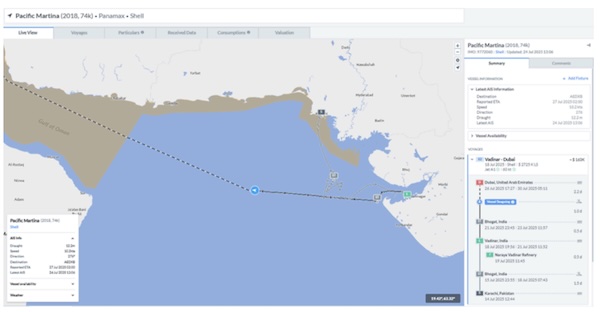
Outside Asia, key destinations for these products include the UAE (22%), South Africa (16%), Malaysia (13%), and the UK (6%), typically reached through hubs like Fujairah, Jebel Ali, and Durban. As export tenders are withdrawn and counterparties grow more cautious, buyers in these regions face the risk of declining spot availability. For petrochemical-dependent economies like Malaysia and the UAE, reduced access to naphtha feedstock could prompt refiners to modify operations in the near term.
Although Nayara accounts for only 10.5% of India’s seaborne clean product exports, the impact of sanctions on its Vadinar refinery suggests that Russian-linked barrels, even if legal under Indian law now, carry heightened reputational and logistical risks. Buyers exposed to Europe-linked shipping, insurance, or financial systems are likely to shift their focus toward alternative suppliers in the Middle East and Southeast Asia, intensifying competition and potentially reducing prompt product availability across key markets.
Source : Signal Ocean

